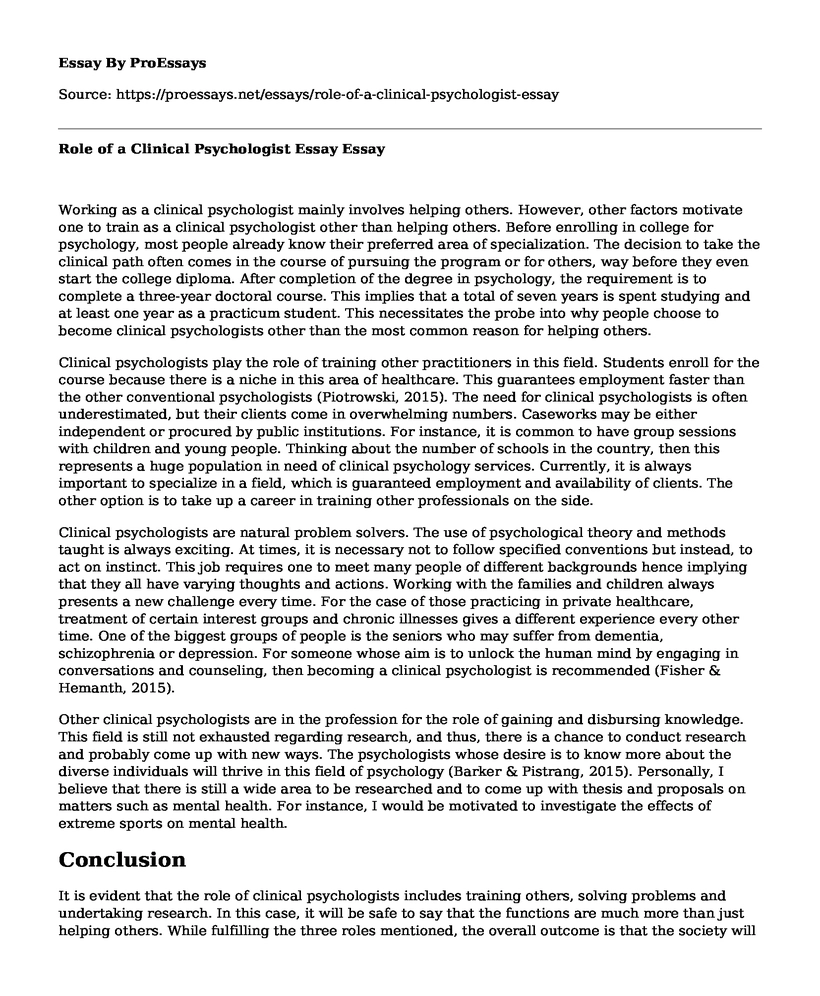Working as a clinical psychologist mainly involves helping others. However, other factors motivate one to train as a clinical psychologist other than helping others. Before enrolling in college for psychology, most people already know their preferred area of specialization. The decision to take the clinical path often comes in the course of pursuing the program or for others, way before they even start the college diploma. After completion of the degree in psychology, the requirement is to complete a three-year doctoral course. This implies that a total of seven years is spent studying and at least one year as a practicum student. This necessitates the probe into why people choose to become clinical psychologists other than the most common reason for helping others.
Clinical psychologists play the role of training other practitioners in this field. Students enroll for the course because there is a niche in this area of healthcare. This guarantees employment faster than the other conventional psychologists (Piotrowski, 2015). The need for clinical psychologists is often underestimated, but their clients come in overwhelming numbers. Caseworks may be either independent or procured by public institutions. For instance, it is common to have group sessions with children and young people. Thinking about the number of schools in the country, then this represents a huge population in need of clinical psychology services. Currently, it is always important to specialize in a field, which is guaranteed employment and availability of clients. The other option is to take up a career in training other professionals on the side.
Clinical psychologists are natural problem solvers. The use of psychological theory and methods taught is always exciting. At times, it is necessary not to follow specified conventions but instead, to act on instinct. This job requires one to meet many people of different backgrounds hence implying that they all have varying thoughts and actions. Working with the families and children always presents a new challenge every time. For the case of those practicing in private healthcare, treatment of certain interest groups and chronic illnesses gives a different experience every other time. One of the biggest groups of people is the seniors who may suffer from dementia, schizophrenia or depression. For someone whose aim is to unlock the human mind by engaging in conversations and counseling, then becoming a clinical psychologist is recommended (Fisher & Hemanth, 2015).
Other clinical psychologists are in the profession for the role of gaining and disbursing knowledge. This field is still not exhausted regarding research, and thus, there is a chance to conduct research and probably come up with new ways. The psychologists whose desire is to know more about the diverse individuals will thrive in this field of psychology (Barker & Pistrang, 2015). Personally, I believe that there is still a wide area to be researched and to come up with thesis and proposals on matters such as mental health. For instance, I would be motivated to investigate the effects of extreme sports on mental health.
Conclusion
It is evident that the role of clinical psychologists includes training others, solving problems and undertaking research. In this case, it will be safe to say that the functions are much more than just helping others. While fulfilling the three roles mentioned, the overall outcome is that the society will be improved. It is therefore needless to say that clinical psychologists are an important link between the community and the medical world and that there are countless roles to be played.
References
Barker, C., & Pistrang, N. (2015). Research methods in clinical psychology: An introduction for students and practitioners. John Wiley & Sons.
Fisher, P., & Hemanth, P. (2015). The development, facilitation and initial evaluation of a mindfulness group for a clinical psychology training course, 12-15.
Piotrowski, C. (2015). On the decline of projective techniques in professional psychology training. North American Journal of Psychology, 17(2), 259.
Cite this page
Role of a Clinical Psychologist Essay. (2022, May 17). Retrieved from https://proessays.net/essays/role-of-a-clinical-psychologist-essay
If you are the original author of this essay and no longer wish to have it published on the ProEssays website, please click below to request its removal:
- Livestock Industry and Its Employment Opportunities - Report Example
- Flight Attendant Position Application Letter
- Spending Time in the Urgent and Important Quadrant: Time Management Essay
- Essay Example on Pro Sports: Big Money, Big Opportunities
- Essay Sample on Overcoming Anxiety: A Guide to Understanding and Coping With Anxiety Disorders
- Essay Example on Mental Illness: Challenges, Symptoms & Care Needed
- Essay Example on Developing Employability Skills for Efficient Employee Performance







